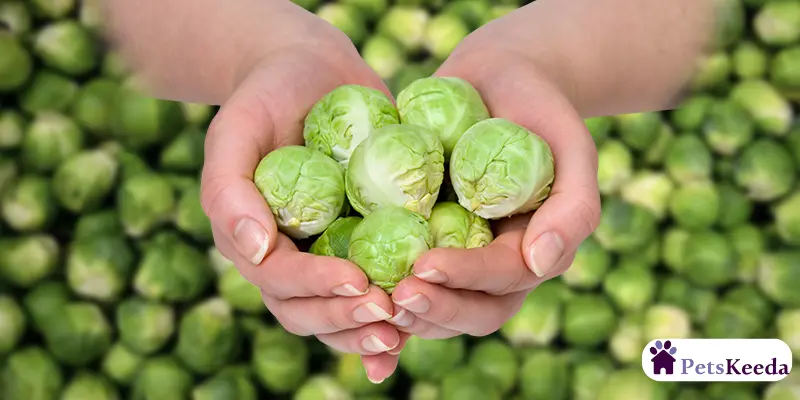Table of Contents
Having a dog as a pet, a dog owner’s thought has crossed his mind many times: what kind of foods safe for our dogs might we be able to share? One of these most thought-about-safe veggies is Brussels sprouts. Can dogs eat Brussels sprouts? Fairly this question is commonly asked by people who want to spoil their dog with a vegetable now and then.
While well-looked for during the festive seasons, Brussels sprouts also have nutritional value. Some considerations need to be made before feeding dogs this vegetable. The following post will deeply examine how Brussels sprouts affect your dog, positively or negatively, and how you can healthily introduce this veggie into their diet.
Are Brussels Sprouts Good for Dogs?
Yes, dogs can eat Brussels sprouts, and these vegetables can be good for them when given in proper amounts. Brussels is good for dogs like many other veggies, but one should proceed cautiously before adding this vegetable to the dog’s bowl. Brussels sprouts are rich in vitamins and nutrients:
- Vitamin K – is crucial for blood clotting and bone health.
- Vitamin C – an antioxidant that boosts the immune system.
- Fiber – aids in digestion and helps maintain bowel health.
- Antioxidants – protect against cellular damage.
When used correctly, these components make Brussels sprouts for dogs a healthy snack.

Are Brussels sprouts bad for dogs?
But giving dogs Brussels sprouts isn’t entirely beneficial. They can create digestive issues and have specific possible harmful effects if consumed in excess or prepared incorrectly.
- Gas and Bloating: Brussels sprouts, due to their high fiber content, can cause gas in dogs, which might be uncomfortable for them. Brussels also contains a complex sugar component called raffinose. Dogs find it difficult to digest these sugars as they lack the enzyme alpha-galactosidase needed to break down such sugar compounds. When dogs eat Brussels sprouts in large amounts, the undigested portion of food remains in the intestines and thus causes the gas. Furthermore, the high fiber level may promote more bowel motions, leading to gas development.
- Gastrointestinal Upset: Overfeeding Brussels sprouts can lead to diarrhea or digestive discomfort. When raffinose in Brussels sprouts reaches the large intestine, the bacteria begin to ferment it, which causes gas and discomfort. Excessive fiber intake can also cause diarrhea, as the digestive system may not absorb enough water from the food waste. The sulfur-containing compounds in Brussels can irritate the gut lining if taken excessively.
Also Read: Can Dogs Eat Cake? Health Benefits & Risks
Can dogs eat Brussels sprouts raw?
Dogs can have Brussels sprouts in moderation, but it’s advisable not to feed your dog raw Brussels sprouts daily because it may cause gastric issues. The question “Can dogs eat Brussels sprouts raw?” often arises, and while they can, the raw form can be challenging to chew and digest for dogs with stomach issues or sensitive stomachs. Cooking the sprouts can make them softer and easier for dogs to digest, significantly reducing the risk of indigestion.
Raw Brussels sprouts can worsen symptoms such as gas, bloating, or diarrhea in dogs with chronic digestive disorders, pancreatitis, or irritable bowel syndrome. It’s best to introduce any new food, including raw Brussels sprouts, slowly and in small amounts to monitor your dog’s reaction.

Benefits of Feeding Your Dog Brussels Sprouts
High Nutritional Content: Brussels sprouts are a great source of vitamins, minerals, and antioxidants, including vitamins K and C, that can help maintain your dog’s health and immune system.
Fiber-Rich: They are an excellent source of dietary fiber, which supports regular bowel movements and helps with digestion. Dogs that have irregular digestive systems may benefit the most from this.
Low in Calories: Due to their low-calorie content, Brussels sprouts are a healthy snack choice for dogs that need to maintain or reduce their weight without sacrificing their nutritional intake.
Anti-Inflammatory Properties: Brussels sprouts include antioxidants with anti-inflammatory qualities, such as kaempferol. Dogs with arthritis or other inflammatory illnesses may benefit from this since it can help decrease inflammation.
Supports Liver Health: According to particular research, eating Brussels sprouts may raise the liver’s enzyme levels, aiding the body’s detoxification and enhancing liver function.
The Downsides of Brussels Sprouts
Gas and Bloating: Raffinose, a carbohydrate that dogs find difficult to digest, is included in Brussels sprouts. This may result in bloating and gas, which may be painful.
Interference with Thyroid Function: Brussels sprouts are goitrogenic, meaning they contain substances that can interfere with thyroid gland function by inhibiting the body’s ability to absorb iodine. This can be particularly concerning for individuals with existing thyroid conditions, although cooking them can reduce these effects.
High in Vitamin K: Brussels sprouts are very high in Vitamin K, which is great for blood clotting and bone health but can be problematic for people taking blood thinners like warfarin. It’s important to keep Vitamin K intake consistent when on these medications.
Allergic Reactions: Although rare, some people may be allergic to Brussels sprouts. Symptoms of an allergic reaction can include itching, swelling, and difficulty breathing.
Potential Contaminants: Like all vegetables, Brussels sprouts can be contaminated with pesticides and other chemicals if not properly washed or sourced from unreliable places. Organic and well-washed Brussels sprouts can help mitigate this risk.
Digestive Issues in Some People: Besides causing gas, in some people, especially those with irritable bowel syndrome (IBS) or other digestive disorders, Brussels sprouts can exacerbate symptoms due to their high fiber content.
How to Prepare Brussels Sprouts for Your Dog
Here’s a simplified guide to prepare Brussels sprouts for dogs:
Clean and Trim: After washing the Brussels sprouts, cut off any discolored leaves and remove the stems. To avoid choking, cut them into smaller pieces according to the size of your dog.
Cook Plain: Steam or boil the Brussels sprouts until they become soft. Adding spices, oil, or salt might be dangerous for dogs.
Cool Completely: Before giving your dog any cooked Brussels sprouts, let them cool completely to prevent burning.
Serve in Moderation: Small amounts of Brussels sprouts should be added to your dog’s diet gradually to see how they respond and ensure they don’t upset their stomach.
How Many Brussels Sprouts Can Dogs Eat?
The appropriate amount of Brussels sprouts for a dog depends on size, overall diet, and health. Generally, Brussels sprouts should be treated as a treat or snack, not a main component of their diet. Treats should comprise no more than 10% of a dog’s daily caloric intake.
Here’s a rough guideline based on the size of the dog:
- Small Dogs: 1 to 2 small Brussels sprouts or a larger one.
- Medium Dogs: 2 to 3 Brussels sprouts, depending on their size.
- Large Dogs: 3 to 5 Brussels sprouts.
When introducing Brussels sprouts to your dog’s diet, it’s important to start with a smaller amount to ensure they digest them well without any gastrointestinal upset. If your dog tolerates them well, you can offer them occasionally as part of a balanced diet. Always get advice from a veterinarian, particularly if your dog has certain medical issues or nutritional requirements.

What Other Veggies Can Dogs Eat?
Many kinds of vegetables are healthful snacks that dogs can eat. Other veggies that are typically good for dogs and safe to eat are as follows:
Carrots
Green Beans
Pumpkin
Cucumbers
Sweet Potatoes
Peas
Spinach
Frequently Asked Questions
Q1. Do Brussels sprouts cause gas?
Ans: Yes, Brussels sprouts can cause gas. They contain raffinose, a type of carbohydrate that is hard for some people to digest, leading to gas production.
Q2. How much fiber is in Brussels sprouts?
Ans: Brussels sprouts are a good source of fiber. One cup of cooked Brussels sprouts contains about 4 grams of fiber.
Q3. Can dogs eat Brussels sprouts cooked?
Ans: Yes, dogs can eat cooked Brussels sprouts in moderation. They provide nutrients such as vitamins and fiber, but too much can cause gas in dogs as well.
Q4. Do Brussels sprouts cause diarrhea?
Ans: Brussels sprouts can cause diarrhea in some people if eaten in large quantities, due to their high fiber content and the presence of sugar alcohols that can act as laxatives.
Conclusion
Can dogs eat Brussels sprouts? Absolutely, but like any human food given to pets, it should be done cautiously and within moderation. Even the little sprouts are extremely beneficial—full of vitamins and antioxidants like their larger, older counterparts.
They can add some health to your dog’s diet if cooked up correctly. Still, be cautious and observe your dog against unwanted gastrointestinal reactions, including gas and bloatedness. Following these guidelines, you will be able to safely add Brussels sprouts to your dog’s diet and help him enjoy their benefits while experiencing minimum negative outcomes.

